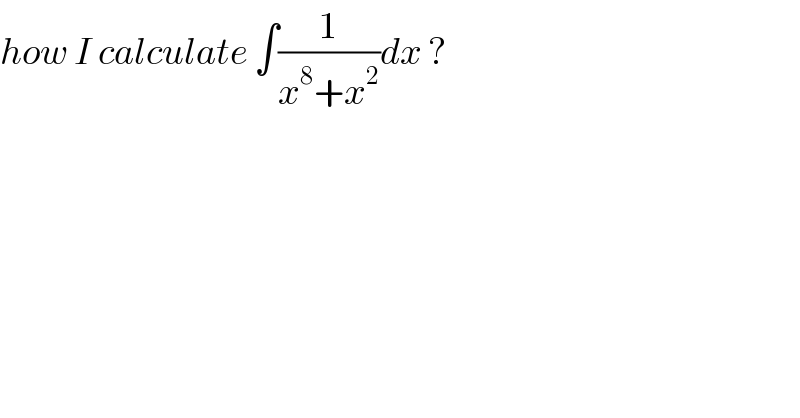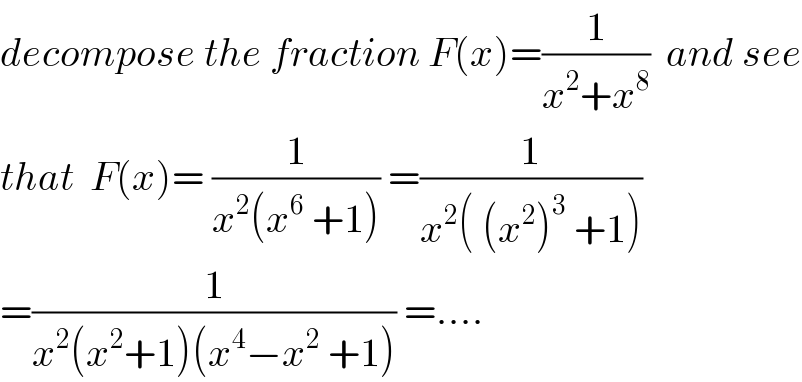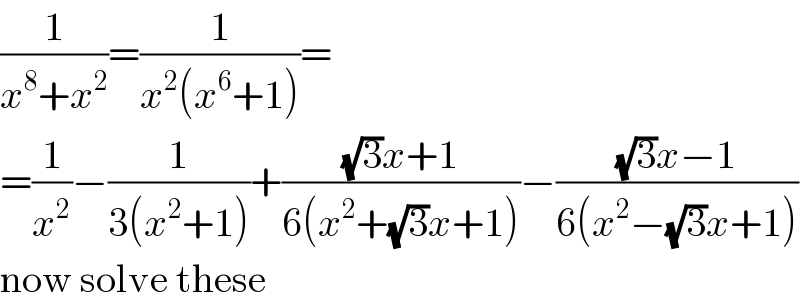
Question Number 76053 by john santuy last updated on 23/Dec/19

$${how}\:{I}\:{calculate}\:\int\frac{\mathrm{1}}{{x}^{\mathrm{8}} +{x}^{\mathrm{2}} }{dx}\:? \\ $$
Commented by abdomathmax last updated on 23/Dec/19

$${decompose}\:{the}\:{fraction}\:{F}\left({x}\right)=\frac{\mathrm{1}}{{x}^{\mathrm{2}} +{x}^{\mathrm{8}} }\:\:{and}\:{see} \\ $$$${that}\:\:{F}\left({x}\right)=\:\frac{\mathrm{1}}{{x}^{\mathrm{2}} \left({x}^{\mathrm{6}} \:+\mathrm{1}\right)}\:=\frac{\mathrm{1}}{{x}^{\mathrm{2}} \left(\:\left({x}^{\mathrm{2}} \right)^{\mathrm{3}} \:+\mathrm{1}\right)} \\ $$$$=\frac{\mathrm{1}}{{x}^{\mathrm{2}} \left({x}^{\mathrm{2}} +\mathrm{1}\right)\left({x}^{\mathrm{4}} −{x}^{\mathrm{2}} \:+\mathrm{1}\right)}\:=.... \\ $$
Commented by benjo last updated on 23/Dec/19

$$\mathrm{thanks}\:\mathrm{sir} \\ $$
Answered by MJS last updated on 23/Dec/19

$$\frac{\mathrm{1}}{{x}^{\mathrm{8}} +{x}^{\mathrm{2}} }=\frac{\mathrm{1}}{{x}^{\mathrm{2}} \left({x}^{\mathrm{6}} +\mathrm{1}\right)}= \\ $$$$=\frac{\mathrm{1}}{{x}^{\mathrm{2}} }−\frac{\mathrm{1}}{\mathrm{3}\left({x}^{\mathrm{2}} +\mathrm{1}\right)}+\frac{\sqrt{\mathrm{3}}{x}+\mathrm{1}}{\mathrm{6}\left({x}^{\mathrm{2}} +\sqrt{\mathrm{3}}{x}+\mathrm{1}\right)}−\frac{\sqrt{\mathrm{3}}{x}−\mathrm{1}}{\mathrm{6}\left({x}^{\mathrm{2}} −\sqrt{\mathrm{3}}{x}+\mathrm{1}\right)} \\ $$$$\mathrm{now}\:\mathrm{solve}\:\mathrm{these} \\ $$
Commented by benjo last updated on 23/Dec/19
![thanks sir]](Q76070.png)
$$\left.\mathrm{thanks}\:\mathrm{sir}\right] \\ $$
Commented by vishalbhardwaj last updated on 23/Dec/19

$$\mathrm{sir}\:\mathrm{this}\:\mathrm{procedure}\:\mathrm{is}\:\mathrm{very}\:\mathrm{difficult}\:\mathrm{to}\:\mathrm{undersatand} \\ $$$$,\:\mathrm{please}\:\mathrm{explain}\:\mathrm{this}\:\mathrm{once}\:\mathrm{again}\:\mathrm{when}\:\mathrm{you}\:\mathrm{are}\:\mathrm{direct} \\ $$$$\mathrm{ly}\:\mathrm{taken}\:\mathrm{any}\:\mathrm{value}\:\mathrm{of}\:\mathrm{x} \\ $$$$ \\ $$
Commented by MJS last updated on 23/Dec/19

$$\mathrm{the}\:\mathrm{decomposing}\:\mathrm{or}\:\mathrm{the}\:\mathrm{integration}? \\ $$
Commented by vishalbhardwaj last updated on 23/Dec/19

$$\mathrm{decomposing} \\ $$
Commented by MJS last updated on 24/Dec/19
![x^8 +x^2 =x^2 (x^6 +1)= =x^2 ((x^2 )^3 +1)= [((p^3 +1=(p+1)(p^2 −p+1))) ] =x^2 (x^2 +1)(x^4 −x^2 +1)= [((x^4 −x^2 +1=0 let x=(√q))),((q^2 −q+1=0 ⇒ q=−(1/2)±((√3)/2)i)),((these are the 2^(nd) and 3^(rd) solutions)),((of q^3 +1=0 ⇒ q=e^(±i(π/3)) )),((⇒ x=e^(±i(π/6)) ∨x=e^(±i((5π)/6)) )),((⇒ x^4 −x^2 +1=)),((=(x−e^(−i(π/6)) )(x−e^(i(π/6)) )(x−e^(−i((5π)/6)) )(x−e^(i((5π)/6)) )=)),((=(x^2 −(√3)x+1)(x^2 +(√3)x+1))) ] =x^2 (x^2 +1)(x^2 −(√3)x+1)(x^2 +(√3)x+1) ⇒ (1/(x^8 +x^2 ))=((ax+b)/x^2 )+((cx+d)/(x^2 +1))+((ex+f)/(x^2 −(√3)x+1))+((gx+h)/(x^2 +(√3)x+1)) now use your (hopefully) learned method](Q76117.png)
$${x}^{\mathrm{8}} +{x}^{\mathrm{2}} ={x}^{\mathrm{2}} \left({x}^{\mathrm{6}} +\mathrm{1}\right)= \\ $$$$={x}^{\mathrm{2}} \left(\left({x}^{\mathrm{2}} \right)^{\mathrm{3}} +\mathrm{1}\right)= \\ $$$$\:\:\:\:\:\begin{bmatrix}{{p}^{\mathrm{3}} +\mathrm{1}=\left({p}+\mathrm{1}\right)\left({p}^{\mathrm{2}} −{p}+\mathrm{1}\right)}\end{bmatrix} \\ $$$$={x}^{\mathrm{2}} \left({x}^{\mathrm{2}} +\mathrm{1}\right)\left({x}^{\mathrm{4}} −{x}^{\mathrm{2}} +\mathrm{1}\right)= \\ $$$$\:\:\:\:\:\begin{bmatrix}{{x}^{\mathrm{4}} −{x}^{\mathrm{2}} +\mathrm{1}=\mathrm{0}\:\mathrm{let}\:{x}=\sqrt{{q}}}\\{{q}^{\mathrm{2}} −{q}+\mathrm{1}=\mathrm{0}\:\Rightarrow\:{q}=−\frac{\mathrm{1}}{\mathrm{2}}\pm\frac{\sqrt{\mathrm{3}}}{\mathrm{2}}\mathrm{i}}\\{\mathrm{these}\:\mathrm{are}\:\mathrm{the}\:\mathrm{2}^{\mathrm{nd}} \:\mathrm{and}\:\mathrm{3}^{\mathrm{rd}} \:\mathrm{solutions}}\\{\mathrm{of}\:{q}^{\mathrm{3}} +\mathrm{1}=\mathrm{0}\:\Rightarrow\:{q}=\mathrm{e}^{\pm\mathrm{i}\frac{\pi}{\mathrm{3}}} }\\{\Rightarrow\:{x}=\mathrm{e}^{\pm\mathrm{i}\frac{\pi}{\mathrm{6}}} \vee{x}=\mathrm{e}^{\pm\mathrm{i}\frac{\mathrm{5}\pi}{\mathrm{6}}} }\\{\Rightarrow\:{x}^{\mathrm{4}} −{x}^{\mathrm{2}} +\mathrm{1}=}\\{=\left({x}−\mathrm{e}^{−\mathrm{i}\frac{\pi}{\mathrm{6}}} \right)\left({x}−\mathrm{e}^{\mathrm{i}\frac{\pi}{\mathrm{6}}} \right)\left({x}−\mathrm{e}^{−\mathrm{i}\frac{\mathrm{5}\pi}{\mathrm{6}}} \right)\left({x}−\mathrm{e}^{\mathrm{i}\frac{\mathrm{5}\pi}{\mathrm{6}}} \right)=}\\{=\left({x}^{\mathrm{2}} −\sqrt{\mathrm{3}}{x}+\mathrm{1}\right)\left({x}^{\mathrm{2}} +\sqrt{\mathrm{3}}{x}+\mathrm{1}\right)}\end{bmatrix} \\ $$$$={x}^{\mathrm{2}} \left({x}^{\mathrm{2}} +\mathrm{1}\right)\left({x}^{\mathrm{2}} −\sqrt{\mathrm{3}}{x}+\mathrm{1}\right)\left({x}^{\mathrm{2}} +\sqrt{\mathrm{3}}{x}+\mathrm{1}\right) \\ $$$$\Rightarrow \\ $$$$\frac{\mathrm{1}}{{x}^{\mathrm{8}} +{x}^{\mathrm{2}} }=\frac{{ax}+{b}}{{x}^{\mathrm{2}} }+\frac{{cx}+{d}}{{x}^{\mathrm{2}} +\mathrm{1}}+\frac{{ex}+{f}}{{x}^{\mathrm{2}} −\sqrt{\mathrm{3}}{x}+\mathrm{1}}+\frac{{gx}+{h}}{{x}^{\mathrm{2}} +\sqrt{\mathrm{3}}{x}+\mathrm{1}} \\ $$$$\mathrm{now}\:\mathrm{use}\:\mathrm{your}\:\left(\mathrm{hopefully}\right)\:\mathrm{learned}\:\mathrm{method} \\ $$
